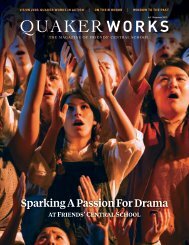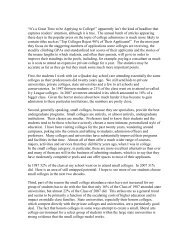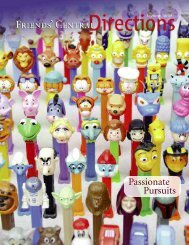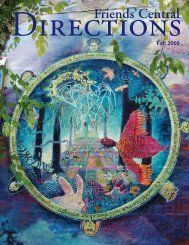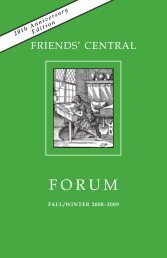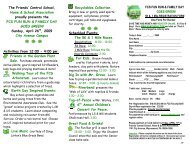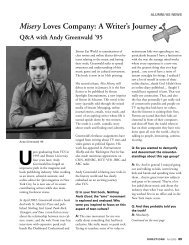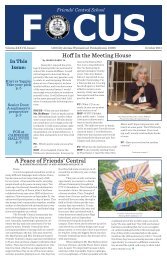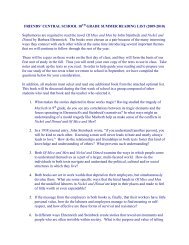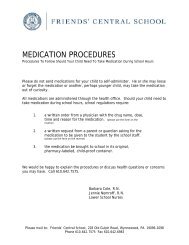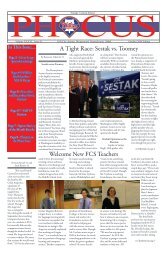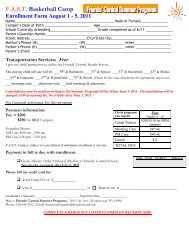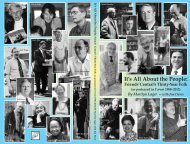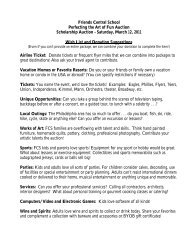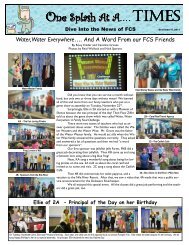2006-2007 Fall/Winter Directions - Friends' Central School
2006-2007 Fall/Winter Directions - Friends' Central School
2006-2007 Fall/Winter Directions - Friends' Central School
You also want an ePaper? Increase the reach of your titles
YUMPU automatically turns print PDFs into web optimized ePapers that Google loves.
FEATURES – FORMER FACULTY<br />
On Surfing, the Middle East,<br />
and Teaching at Friends’<strong>Central</strong><br />
by Harvey Zendt<br />
t’s 7:55 on Monday morning, and<br />
the peace and serenity of my empty<br />
classroom is transformed quickly into a<br />
burst of adolescent energy. There are a dozen<br />
different conversations going on simultaneously,<br />
ranging in subject matter from weekend<br />
plans to world issues to the many events of<br />
the school week. There are always at least a<br />
few that involve me—questions, advice, a go<br />
at the latest joke.<br />
And then it’s 3:15 on Friday afternoon. The door of the classroom<br />
closes behind the last student to leave. My heart rate<br />
diminishes a few beats, as I begin to reflect on the week and what<br />
I need to do to prepare for Monday.<br />
What happened in between these two moments can be<br />
described with many adjectives—rewarding, exhausting, fun,<br />
enriching just to name a few. For fifteen years that rushing space<br />
of time was my life. Whether it was teaching fifth grade, Lower<br />
<strong>School</strong> science, Middle <strong>School</strong> social studies and language arts,<br />
coaching soccer and wrestling, or chaperoning trips to Quebec,<br />
the beach or French Creek State Park, my life was a fuller, more<br />
enjoyable one because of my interactions with the students,<br />
teachers, and parents between Monday and Friday at Friends’<br />
<strong>Central</strong>.<br />
My interest in teaching began while I was still in high school<br />
and, as a counselor at camp, first felt the joy of helping a child<br />
grow. After college, I taught for a year in the parochial school<br />
system in Philadelphia, but quickly felt the need to work in an<br />
environment that had a philosophy more<br />
similar to mine. Much to my great fortune,<br />
former headmaster Tom Wood called me in<br />
August, just weeks before the start of school,<br />
with a last minute opening, and Friends’<br />
<strong>Central</strong> became home!<br />
People often ask how the field of education<br />
has changed in the last thirty years.<br />
Certainly technology has brought many differences,<br />
as have new pedagogical trends and<br />
the more complicated nature of society in<br />
general. The vast capital improvements in<br />
schools make the entire process of education<br />
easier—just ask any Friends’ <strong>Central</strong> wrestler<br />
of the ’70s or ’80s who experienced life in<br />
the “Bump.” The essence of teaching, however,<br />
the chance for a teacher to unlock doors<br />
34 DIRECTIONS <strong>Fall</strong> <strong>2006</strong> / <strong>Winter</strong> <strong>2007</strong><br />
and help children blossom in<br />
unexpected ways has not<br />
altered a bit. I have been<br />
Harvey Zendt<br />
blessed with an educational<br />
career that includes seven different institutions, but when I think<br />
about my pedagogical roots and my true joy for teaching,<br />
Friends’ <strong>Central</strong> is the first image that comes to mind.<br />
What made my experience at Friends’ <strong>Central</strong> so<br />
special? I would begin with the Quaker ethos of the school,<br />
one of acceptance and appreciation of the diversity of experiences<br />
and perspectives represented in the community. I remember a<br />
series of particularly intense debates in an eighth grade world cultures<br />
class about the crisis in the Middle East. It was a tense time<br />
and a tense subject, but in my classroom, supported by the ethos<br />
of the <strong>School</strong>, Christian, Jewish, and Islamic students were able<br />
to share their thoughts reasonably as well as passionately. There<br />
are few places in the world where this volatile issue could be discussed<br />
with such sensitivity.<br />
Next I think of the trust the <strong>School</strong> gives to its teachers to do<br />
what they think is right academically and socially for the children.<br />
For many of us this means incorporating who we are as<br />
people into our curriculum. I have a passion for surfing and was<br />
able to share that love with many students within the context of<br />
the mission of the school by teaching the physics of the wave. I<br />
know that in many schools today such an activity would be considered<br />
“fluff,” but creative elaborations and personal connections<br />
such as this are part of the substance of the Friends’ <strong>Central</strong><br />
experience.<br />
Finally, I think of the appreciation the<br />
community expressed for the work all of<br />
us do with children. Whether it was a<br />
thanks from a wrestler at the end of the<br />
season, a comment in Meeting for<br />
Worship, or a note from a parent at the<br />
end of the year, I always felt encouraged<br />
and validated for all of my efforts. This<br />
appreciation continues, in fact. Just last<br />
year I received a book about coaching<br />
from a wrestler, with whom I had worked<br />
in the mid ’80s but hadn’t seen since.<br />
Gestures such as this, the willingness to<br />
connect with each other, have given me<br />
the impetus to become not only the best<br />
teacher I can, but also, I hope, the best<br />
person.



